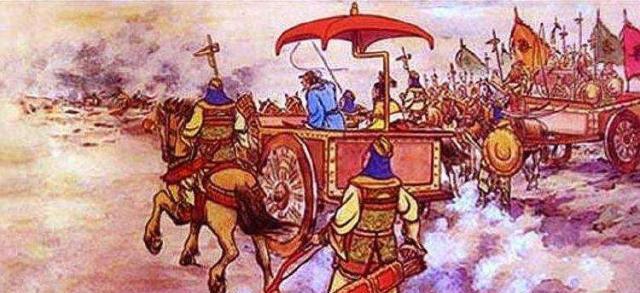
In the Spring and Autumn Warring States period, most of the warring sides attached importance to the matter of war drums, and the role of war drums was mainly to motivate people's hearts, the most famous of which was that when the Duke of Luzhuang and the State of Qi fought, Cao Jie fully used the role of war drums, the so-called "one drum is prosperous, then the drum is weak, and the third drum is exhausted." "In fact, Cao Jie may have used a conspiracy."
All the armies that fight in battle often want to win with one drum, but there are only a few people who win with one drum, in addition to Cao Jie's one drum and victory over the Qi army, there are three other figures who also won with one drum. Duke Huan of Qi "personally led his division to Suicheng and went down with one drum, because he was stationed in Jishui", there were Xianxun "no one to defend the imperial palace, and one drum was pulled out", and Li Xin "was young and brave, and he attacked Pingyu City with one drum", and there were only a few who could decide the victory or defeat of the battlefield with one drum.
Spring and Autumn is about a righteous war, in which the two sides line up, beat the drums of war, and then confront each other head-on. Cao Jiao waited for the State of Qi to "exhaust the three drums", and only then ordered Lu Guo to beat the war drum, "One drum and Fang Ying, with the exhaustion of the Ying, not to win what", the Qi people may also be wondering, I daQi Guo knocked a drum, Lu Guo did not respond. After knocking on the drum twice, there was still no response, and the qi army's generals' combat enthusiasm showed a decaying appearance.
So, what should be done when the drumming in the Spring and Autumn Warring States Period was done when a drum was struck? After hitting two drums, what should I do? What about three, four, five drums? At that time, the drumming thing was very important, as long as the drum sounded, it was going to be an accident. It's not telling the time, it's not playing music, it's something big happening. So as soon as the drums sound, something is definitely going to happen.
At that time, drumming had strict procedural regulations. For example, when Sun Wu was training the army in the State of Wu, he "commanded the drumming, one drum stood up, the second drum swirled, and the three drums fought together", and when the three drums were played, both sides of the bell should start a bloody fight. Looking at the Cao Jiao controversy in this way, it can be said that Cao Jie only deliberately violated the rules of the war drums, maintained the combat effectiveness of the Lu army, and then rushed to kill the Qi army in the clouds and fog with one blow.
Of course, in addition to combat, if you hit the drum twice, you may also have the time to tell the story. For example, King Xuanwang of Zhou once had a dream that "the night leaked two drums, and the human voice was silent", and the sound of these two drums obviously appeared in the early morning. Then there is the sound of the three drums, at this time or as for deep sleep, even those border and Miyagi guards are in a hazy time, and many chaotic battles occur at this time. It was after the "Three Drums of the Night" that the prince rode into Miyagi and expelled King Xiang of that week from the imperial city. There was also a time when the State of Chu was at war with the State of Wu, and the general of the State of Chu also wanted to take advantage of the darkness of the night, "when the three drums were", to attract elite soldiers to sneak into the camp of the State of Wu.
As for the three drums, it is the time when the day and night will not be divided, and the marching battle will either talk about sneak attack at night or march early, and the marching thing is likely to be after the four drums. When Zhao Kuo led the army to fight, it was "commanded in the army, four drums to make rice, five drums to end, and Pingming to advance", and when Lü Buwei led the troops to fight, there was also "about four drums to rise up and attack Chuzhai".
As for the five drums, it was probably already dawn. "It was the fifth drum of the day, Zhou Wei lifted the car first, and the temple gate was about to reach, and suddenly he looked back and shouted: Zhou Xun wears a small man, a snake and a traitor." If there is no dawn, how can you see the characters in front of the temple gate? It is also said: "Order the five drums to be full of food and cross the river together", the Chu state xue shot and fought against the state of Wu, and arranged for the five drums to eat. The time of the five drums may still be the official working time at that time, when Jin Wengong was practicing the princes of the soil, there were "five drums the next day, ten road princes, crown peiyu, neat and tidy, dancing dust, gong gong ji ji", and sun Wu when training palace women in Wu Kingdom, it was also "the next day five drums, the palace women two teams arrived at the teaching field", just like today's time, it is time to go to work.